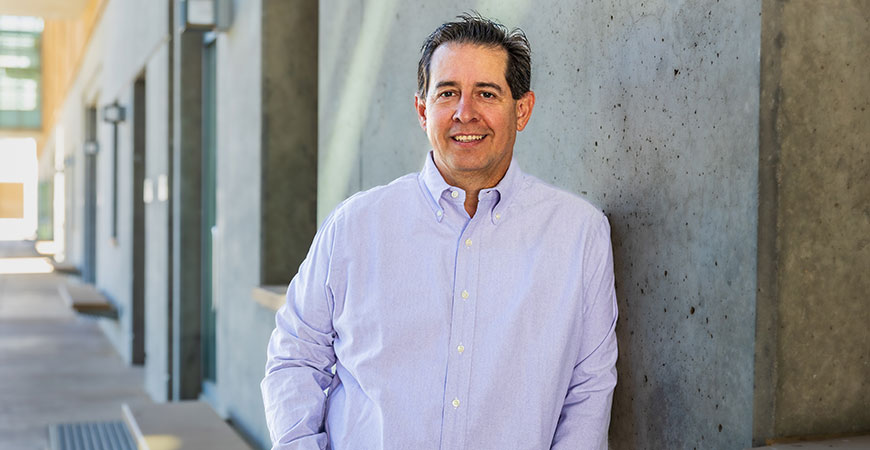
Physiology Professor Rudy M. Ortiz has been named this year's winner of the A. Clifford Barger Underrepresented Minority Mentorship Award by the American Physiological Society.
The UC Merced professor was recognized for his leadership, guidance and mentorship of underrepresented minority and diverse groups of students in the physiological sciences.
Professor L. Gabriel Navar, Ortiz’s postdoctoral mentor at Tulane University, nominated Ortiz for the award, citing the high regard his peers have for him, his deep conviction for advancing minority education, his leadership and initiative and his “exceptional mentorship.”
“Rudy is an ambitious, energetic and highly talented Chicano physiologist with very strong scientific credentials and academic experience, which stems from his equally strong ties to the Hispanic scientific community,” Navar said. “I would also hasten to add that he is a great role model for minority students and investigators from underrepresented groups, in particular, Hispanic Americans.”
Ortiz’s students also wrote letters of support for the nomination.
“This is a great honor,” Ortiz said. “Not only to be recognized by those I mentor but to be given an award named for someone I greatly admire. Unfortunately, I never had the opportunity to meet him, but I would have liked to. He was very well known for his work in promoting underrepresented students.”
Abraham Clifford Barger was a physiology professor who spent his entire career at Harvard Medical School. His research focused on the pathophysiology of heart failure and on the role of the kidneys in hypertension – an area of research Ortiz also specializes in.
Barger was president of the American Physiological Society (APS) and was elected to the Institute of Medicine. He graduated from Harvard University and Harvard Medical School and served in the U.S. Army as a researcher at the Climatic Research Laboratory before returning to Harvard as staff.
Barger is recognized as a key contributor to the modern understanding of the pathophysiology of heart failure, specifically in the study of coronary artery disease and renovascular hypertension.
In the 1960s, he became involved in efforts to support women and minority scientists, convincing the APS to use funds from a gift to help underrepresented minorities in physiology.
Ortiz is a founding faculty member at UC Merced and is an affiliate of the Health Sciences Research Institute. He is a member of the Department of Molecular and Cell Biology in the School of Natural Sciences. He is a member of the Society for Advancement of Chicanos/Hispanics and Native Americans in Science and the Hispanic Association of Colleges and Universities. He served as a Fellow in HACU’s Leadership Academy (La Academia de Liderazgo), focusing on increasing diverse representation in executive and senior-level positions in higher education.
He has led or co-led several initiatives to increase diversity among science, technology, engineering and mathematics (STEM) students, including a National Institutes of Health-funded program in bioinformatics and the USDA-funded Facilitating Agriculture-Related Mentoring for Emerging Research Scholars program to train students in a variety of agriculture-related subjects.
To be eligible for the Barger Award, Ortiz must demonstrate that he has made significant impacts on diversity in physiology. The award recognizes mentoring as a highly valued professional activity and raises the visibility of researchers who mentor students from diverse backgrounds.
Being an award recipient means Ortiz has served as an outstanding role model in promoting diversity and inclusion of underrepresented minority and diverse groups in the field of physiological sciences, has been a successful leader in his field and has shown a commitment to the career goals and professional development of his students, according to the APS.
Ortiz will be formally recognized with the award at the American Physiology Society’s Summit in Baltimore in April.






